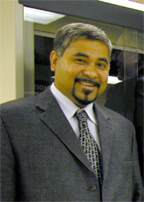-IAST director
Professor Suresh Narine has lauded President Bharrat Jagdeo’s initiative on avoided deforestation particularly his proposal that countries whose industries pump huge amounts of carbon dioxide into the atmosphere reimburse countries that conserve their forests.

Narine, who is the Director of the Institute of Applied Science and Technology (IAST) told UG’s Earth Science students at a lecture also attended by Prime Minister Samuel Hinds, that reducing the number of forests upsets the equilibrium of carbon in the atmosphere. In his lecture titled ‘Guyana and the Biological revolution: Carbon as a Commodity and Opportunities for Guyana’, held on Wednesday to observe Earth Day, Narine said cutting down forests results in a decline in the carbon sink side of the equation disrupting the equilibrium of carbon in the atmosphere, as it is generally accepted that deforestation leads to an increase in atmospheric carbon.
Narine noted that Guyana has taken a leadership role by actually placing a price tag on the services of its forest. According to a Government Information Agency press release in December, the president had unveiled Guyana’s position on avoided deforestation at which time he indicated that the country’s forest could generate economic value between $430M and $2B per year.
The professor said climate change has begun to threaten developing countries’ ability to produce. He said, “Since the 1940s we’ve been pumping carbon-carbon bonds petroleum from the earth at an alarming rate” and by the rate carbon is released into the atmosphere by deforestation and through these impacts emitting far more carbon “that we are sequestering the carbon cycle is ineffective if this continues.” He said food prices will continue to rise, commensurate with the increased demand and with industries that are much more price-elastic than the food industry has traditionally been.
In the light of this Narine said he was proposing that in addition to the president’s stance on avoided deforestation, Guyana should also offer another alternative in conjunction with the deforestation efforts. He said too tremendous effort should be placed on growing more food since the country has a history of agronomy and skilled primary production agricultural workers, a very low population density and low investment in value-added processing.
Narine also said because the Caribbean market is close, with an absence of tariffs, Guyana is well served with port facilities and has a strategic position that would allow trade with the South American sub-continent, to immense benefit.
